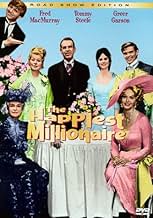Aggiungi una trama nella tua linguaClever yet hapless new butler John Lawless manages a Philadelphia household for quirky and joyful millionaire Anthony Drexel Biddle, his unflappable wife, Cordelia, and their spitfire daught... Leggi tuttoClever yet hapless new butler John Lawless manages a Philadelphia household for quirky and joyful millionaire Anthony Drexel Biddle, his unflappable wife, Cordelia, and their spitfire daughter, Cordy.Clever yet hapless new butler John Lawless manages a Philadelphia household for quirky and joyful millionaire Anthony Drexel Biddle, his unflappable wife, Cordelia, and their spitfire daughter, Cordy.
- Regia
- Sceneggiatura
- Star
- Candidato a 1 Oscar
- 2 candidature totali
- Party Guest
- (non citato nei titoli originali)
Recensioni in evidenza
This is probably because the star of the film should have been butler Tommy Steele who begins the picture on a high note with the clever tune Fortuosity. Steele is toothy and with that broad smile, he could easily captivate audiences. Unfortunately, he soon falls into a rather supporting role to an eccentric Biddle family.
Fred MacMurray is all right for the part but his monotone voice is annoying at times. As his wife, Greer Garson, is wonderful. She depicts that regal elegance that made her so famous through the years. She is just an older, elegant version of Mrs. Miniver and all the other great roles she had in the 1940s.
Gladys Cooper is a rather tame Auntie here. Cooper was always at her best when she was an upper class mean person. The upper class is certainly there but where is her usual nastiness? Ditto for Geraldine Page. Page as Lesley Ann Warren's prospective mother-in-law causes mayhem as she usually did in pictures. This being a musical comedy, her usual frustrations are missing and we could have used them there.
Enough with the alligator scenes already. MacMurray and family wear their bible shirts and practice boxing. MacMurray is anxious for the U.S. to be prepared for World War 1 and he urges President Wilson for this preparedness.
The big surprise of this film is that all our players could carry a tune. I thought that the argument scene between Cooper and Page would have been exacerbated.
The film falters as we have seen the bar-room brawls and social fights among the upper classes in society before.
Which is why I find the critical drubbing it's taken over the years, particularly Leonard Maltin's in his book "The Disney Films," so hard to understand. "Happiest Millionaire" is what many family films try to be today, rarely succeeding. I was given a video of it as a present recently and found it just as enjoyable as I did 32 years ago, if not more so. Plus, living in the Philadelphia area as I do today, there's the historical interest, as well.
In short, "Happiest Millionaire" was great in 1967, and even better today. If you can see it, by all means do. You'll be in for a rare treat and a hidden treasure from the Disney vaults!
The result was a pleasent, somewhat entertaining but all-around silly and, for the most part, instantly forgettable confection. Yes, it's fine for the whole family, but it will be hard for the kiddies (and even the adults) to stay awake as the rather simple story is stretched to nearly three hours, with a series of plotlines connected by merely a shimmer all going on at once. Macmurry is at his least inspired, making the title character into a bumbling, blustering idiot; it's pretty hard not to cheer whenever someone shows him up, verbally or physically. The songs are nice enough, but only one or two really stick in the memory, and half of them are totally irrelevant. (I saw the restored roadshow edition; there are a variety of other editions that cut out several of the songs) Still, Tommy Steele is likable as the forever perky Irish butler (He gets a very hummable song to sing called "Fortuosity") and the chereography certainly is lively. The songs, for all the irrelevance of many of them, really move the picture along, as it slows down considerably whenever the screenplay takes over.
It's too bad Disney's last film couldn't have been better, but oh, well. That's life.
Lo sapevi?
- QuizRichard M. Sherman had reservations about whether Fred MacMurray was right for the part of Anthony J. Drexel Biddle, but Walt Disney overruled him.
- BlooperIn the opening scene, the camera appears to look East on Walnut Street, past Rittenhouse Square, with the tower of Philadelphia City Hall in the distance. Cars are shown on a drive in the square. No such drive ever existed. City Hall is on Market Street and the tower would have been outside the frame of this shot.
- Citazioni
John Lawless: [to camera] To have your alligators thaw out and your daughter forgive you all in the same bright morning, that's fortuosity.
Anthony J. Drexel Biddle: [peering quizzically into the camera] John?
John Lawless: Sir?
Anthony J. Drexel Biddle: Who are you talking to?
John Lawless: No one, sir.
Anthony J. Drexel Biddle: Well you know what they say about people who talk to themselves.
[starts to walk away then turn and peers at the camera again]
John Lawless: [winks at the camera]
- Curiosità sui creditiThe opening credits alone are 5 minutes long.
- Versioni alternativeOriginally premiered at 159 minutes, the film was cut to 144 minutes when box office returns were less than expected. Still doing inadequately, the film was further cut to 120 minutes for general release. The longer version was rereleased in 1984.
- ConnessioniFeatured in Film Review: The Disney Legend (Continued) (1967)
I più visti
Dettagli
- Data di uscita
- Paese di origine
- Sito ufficiale
- Lingua
- Celebre anche come
- The Happiest Millionaire
- Luoghi delle riprese
- Azienda produttrice
- Vedi altri crediti dell’azienda su IMDbPro
- Tempo di esecuzione
- 2h 21min(141 min)
- Proporzioni
- 1.66 : 1





































